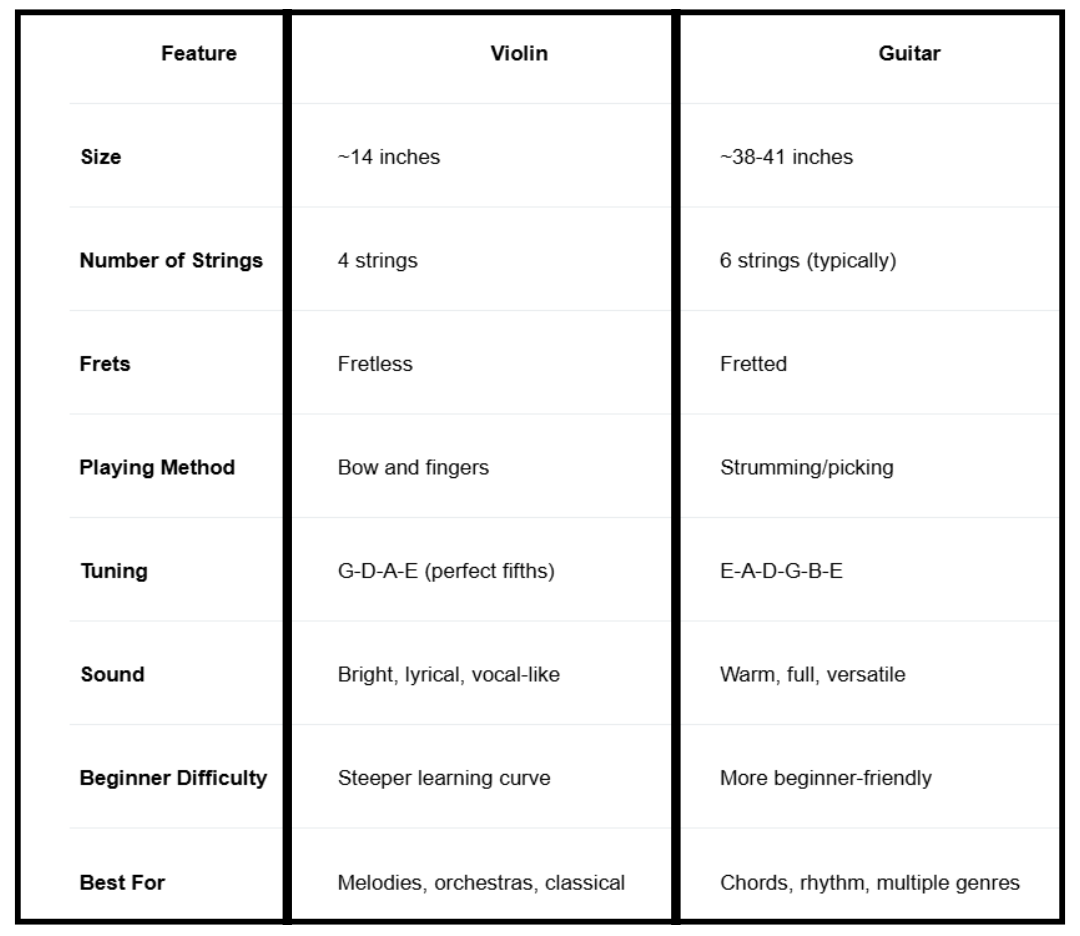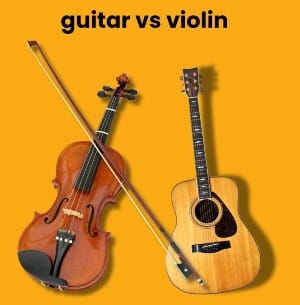
Vishal Agarwal
SME, Western Vocals
Table of Contents
When you start exploring musical instruments, guitar vs violin is one of the most common comparisons people make. Both instruments are iconic, expressive, and extremely popular worldwide. While they share some similarities like wooden bodies, strings, and fingerboards, the experience of playing them is completely different.
The difference between guitar and violin goes beyond just appearance. Everything from their sound and technique to tuning and musical roles varies significantly. If you've been curious about these two beautiful instruments, here's a quick overview:
Guitar vs Violin: Quick Comparison

Now let's have a clear and simple breakdown.

1. Physical Structure: Guitar vs Violin
The first noticeable violin and guitar difference is in their size and shape. A full-size violin is quite small, measuring roughly 14 inches in length. A guitar, whether acoustic or electric, is much larger at around 38 to 41 inches.
The violin has a curved, hollow body with no frets and is played with a bow. A guitar has a larger body with a wider fretboard, visible frets, and is played with fingers or a pick.
Key Structural Differences:
- Violins have 4 strings; guitars typically have 6 strings
- Violins are fretless; guitars have frets to guide finger placement
- Violins are played with a bow; guitars are strummed or picked
- Guitars have a longer neck and a larger overall body
These design differences naturally affect how the instruments feel, sound, and are played.
2. Violin Strings vs Guitar Strings: Material and Tuning
The strings are another major difference in guitar vs violin. Let's look at violin strings vs guitar strings in detail.
Violin Strings:
- Usually made of steel core, synthetic core, or sometimes gut
- Tuned to G-D-A-E in perfect fifths
- Designed for bowing and sustained notes
Guitar Strings:
- Acoustic guitars use steel strings
- Electric guitars use nickel or steel strings
- Classical guitars use nylon strings
- Tuned to E-A-D-G-B-E in a mix of fourths and one major third
Because of this tuning difference, violins are naturally suited for expressive melodies, while guitars excel at chords, harmony, and rhythm.
3. Playing Technique: Bowing vs Strumming
One of the biggest differences in the guitar vs violin comparison is technique.
Violin Technique: The violin is mainly played with a bow, which creates smooth, sustained notes. It requires precise finger placement because there are no frets to guide you. Even a tiny shift can make a note sharp or flat. This demands excellent ear training and muscle memory.
Guitar Technique: Guitarists usually strum or pluck the strings, giving the instrument a more rhythmic and sometimes percussive feel. Guitars are generally easier for beginners because frets help maintain accurate pitch. However, guitars have their own complex techniques like string bending, slides, fingerpicking, tapping, and harmonics.
Learn more about Acoustic Guitar vs Electric Guitar, the key differences between acoustic and electric guitar and which is right for you.

4. Sound and Tone
When comparing guitar vs violin, the sound they produce is distinctly different.
Violin Sound: A violin naturally produces a bright, expressive, almost vocal-like tone. It can sound sweet, emotional, intense, or dramatic depending on how the bow is used and the pressure applied. The violin's voice is often described as soaring and lyrical.
Guitar Sound: A guitar has a fuller and warmer sound. Acoustic and classical guitars resonate naturally with rich overtones, while electric guitars can create an endless range of tones depending on amps and effects. Guitars can be gentle and soothing or powerful and aggressive.
Both instruments are incredibly expressive, but they shine in different ways.
5. Music Genres
The violin and guitar serve different roles across various music genres.
Where Violins Shine:
- Classical music (orchestras, chamber music)
- Folk music (country, bluegrass, Celtic)
- Film scores and soundtracks
- Western and Indian classical traditions
- Jazz and fusion (sometimes)
Where Guitars Dominate:
- Rock, metal, and blues
- Pop and indie music
- Jazz and country
- Folk and singer-songwriter styles
- Bollywood and world music
Simply put, violins are known for soaring melodies and emotional expression, while guitars are known for groove, harmony, and versatility across genres.
6. Guitar vs Violin: Which is easier?
Many beginners wonder about the difficulty level when comparing violin and guitar.
Guitar: Most people find the guitar easier in the beginning because:
- Frets help with accurate pitch
- You can play simple chords within weeks
- Self-learning resources are widely available
- Immediate gratification with strumming patterns
Violin: The violin has a steeper learning curve because:
- Requires precise bow control and posture
- No frets mean you must develop perfect pitch placement
- Proper technique is crucial from day one
- Takes longer to produce a pleasant sound
However, both instruments take years of dedicated practice to truly master. The "easier" choice depends on your musical goals and patience level.
Conclusion: Which One Should You Choose
The difference between guitar and violin is significant, but both are beautiful instruments that offer unique musical experiences. When deciding between guitar vs violin, your choice should depend on your musical interests and goals.
Choose Guitar If:
- You love harmony, chords, and songwriting
- You're interested in rock, pop, or indie music
- You want quicker initial progress
- You enjoy rhythm and accompaniment

Choose Violin If:
- You're drawn to emotional melodies and expressive playing
- You love classical or folk music
- You don't mind a steeper learning curve
- You want to play in orchestras or ensembles
Remember, there's no wrong choice when it comes to guitar vs violin. Both the violin and guitar have their own beauty, challenges, and rewards. Some musicians even learn both instruments over time to expand their musical horizons.
Whatever you choose, the most important thing is to enjoy the journey of learning and making music!
And if you want to learn guitar online or take online violin classes, you can visit our website to explore the course structure and what you'll learn in more detail. Experience learning online with a live and personalised class 1-on-1 with Spardha's expert and friendly teachers with first class free. Book your first free session and start learning.
Frequently Asked Questions
1. Is a violin the hardest instrument?
Violin is considered to be one of the hardest instruments to learn. Because it lacks frets and requires precision as well as coordination between the left and the right hands for finger placement and bowing. But it is equally rewarding if you are okay with slow progress at the beginning because it is one of the most beautiful instruments you can learn to play.
2. Which is easier, guitar or violin?
No, the violin is generally considered more difficult to learn than the guitar, especially for beginners. The guitar offers quicker initial results due to frets that help with pitch, while the violin is fretless, requiring precise finger placement and a good ear. Additionally, violin requires mastery of a complex bowing technique from the start, whereas basic guitar strumming is simpler to grasp initially.
3. Which is more expensive, guitar or violin?
Generally, a violin is more expensive than a guitar, especially when factoring in ongoing costs like maintenance and lessons. While both have a wide price range, the entry point for a good quality violin is typically higher than for a guitar.
4. Can I play violin if I play guitar?
Yes, a guitarist can learn to play the violin, and some guitar skills will transfer, but it requires learning a new set of techniques, especially the use of the bow, and a new approach to intonation on a fretless instrument. While the foundational knowledge of music theory is shared, the physical execution and sound production are very different, meaning a guitarist will not be able to play the violin immediately but will likely have an easier start than a complete beginner.
